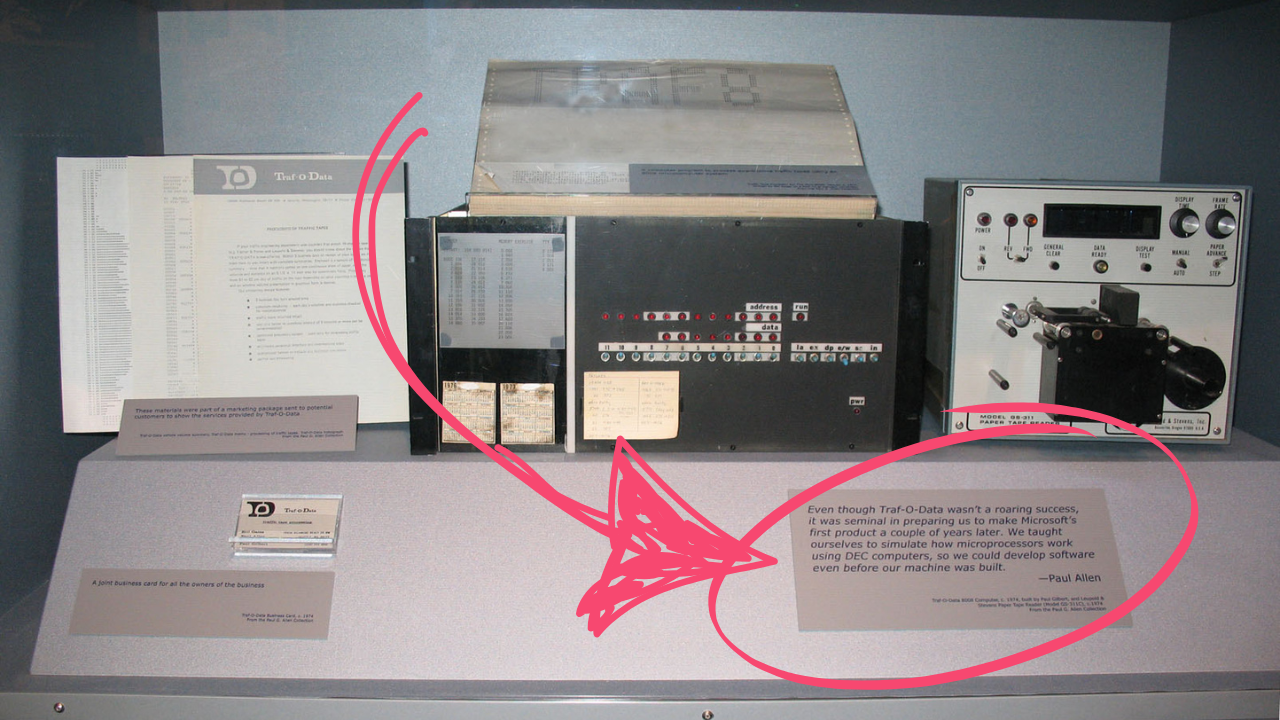The Most Important Failure in Tech History
The Failure That Built Microsoft
The Failure That Built Microsoft
Before Microsoft became a trillion-dollar tech giant, before Windows dominated our screens, and long before Bill Gates became a billionaire, there was a failure that we rarely talk about.
It was called Traf-O-Data, and it's probably one of the most important failures in tech history.
The Year Was 1972. Two teenage tech enthusiasts, Bill Gates and Paul Allen, are huddled over a clunky machine in Seattle. Gates is still in high school, and Allen is in college. They're convinced they've struck entrepreneurial gold with their first business venture.
Their big idea? A device using an Intel 8008 microprocessor to read traffic data from those black rubber tubes you see stretched across roads. The machine would process this data and create reports for cities to use in traffic planning. Brilliant idea, right?
The Big Demo Day
They'd spent countless hours perfecting their machine. Fueled with amazing optimism, the big moment arrived. They took their precious Traf-O-Data machine to demonstrate it to a Washington State traffic engineer.
The room was quiet. The anticipation was thick. They flipped the switch and...
Nothing. Absolutely nothing.
The machine just sat there, refusing to read the data.
Complete and utter failure.
Ouch. I've been there too.
My Own Dance with Failure
I've also launched projects that I was convinced would be game-changers. I'm talking all-in, burning-the-midnight-oil kind of commitment. The kind where you're having a hard time sleeping and can't stop to think about it.
They bombed. Hard.
In entrepreneurship, we call this "learning experiences" or "pivot points." The rest of the world calls them FAILURES!
But let me be honest – experiencing these moments, feel like complete end of the world. Plain and simple.
But here's where it gets interesting. Traf-O-Data wasn't just a failure – it worked like a compass. While the business itself barely sold $20,000 over its lifetime, it revealed something crucial: Gates and Allen weren't hardware guys. Their true genius lay in software.

Fast forward to 1975. Paul Allen spots the Altair 8800 computer in Popular Electronics magazine. This time, armed with the wisdom from their Traf-O-Data experience, they make a critical decision: forget hardware, focus on software.
They launched Microsoft, and well... you know how that turned out.
The Hidden Gold in Failed Ventures
Here's a mind-bending thought: What if Traf-O-Data had been moderately successful? What if it had made just enough money to keep Gates and Allen in the traffic analysis business?
No Microsoft.
No Windows.
No personal computing revolution as we know it.
Sometimes, failure isn't just a teacher – it's a catapult.
Looking back at my own failed projects, I see the same pattern. Each failure wasn't just telling me what didn't work – it was screaming at me about what could work.
Like Gates and Allen, I had to learn to stop forcing my ideas and start paying attention to where my true strengths lay.
The Failure Decoder
So how do you turn your failures into forward momentum? Here's what I've learned:
- Look for the Pattern
- What parts of your failed project actually worked?
- Which elements got you excited, even when things were tough?
- What skills emerged that you didn't know you had?
- Plan the Redirect
- Where is your failure trying to push you?
- What opportunities opened up because this one closed?
- What would you do differently with what you know now?
- Study the Data
- What did you learn about your market?
- Which assumptions were wrong?
- What unexpected discoveries did you make?
The Real Success Secret
Here's the truth that took me years to understand: Success isn't about avoiding failure. It's about failing in the right direction. Gates and Allen didn't just fail and move on – they failed and learned. They failed and evolved. They failed and redirected.
Those projects that crashed and burned? Our Traf-O-Data moments? Instead of burying it in shame, I encourage you to dig into it. What's it telling you about your true path?
Every success story experiences a flop. Microsoft's did. Netflix Qwikster misstep. Tesla's first cars caught fire. Apple's Newton was a disaster. The question isn't whether we'll fail – it's what we'll learn when we do.
Keep going. Your Microsoft moment might be just around the corner.
#BeBusinessSmart

